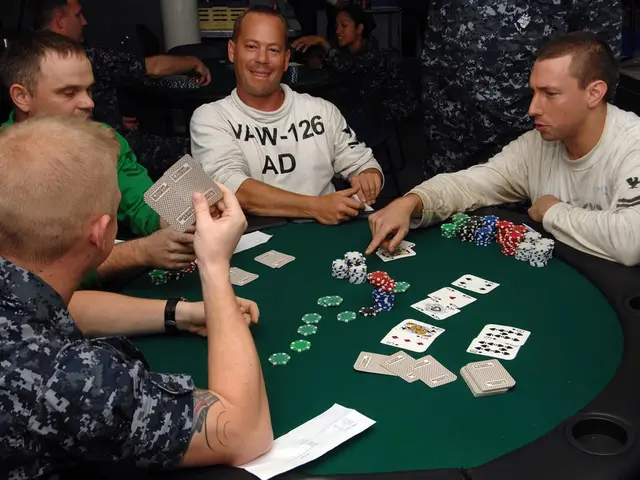Listening and Learning: Unraveling the Similarities Between Gambling Disorders and Substance Abuse
Understanding and Addressing Gambling Addictions Starts with Active Listening
When it comes to addiction, Dr. Jim Whelan, the esteemed head of the Tennessee Institute for Gambling Education and Research, knows a thing or two. He listens intently to every patient struggling with a gambling disorder, learning their history, their urges, and the escapism that fuels their relentless gambling.
"Everybody is different," Whelan says, underscoring the individualized nature of addiction. The parallels between gambling disorder and substance abuse become strikingly apparent in Whelan's work with patients.
Much like those battling substance abuse, gambling addicts exhibit compulsive behaviors, often driven by a dysregulated brain reward system. Michelle Hatfield, Kindbridge Behavioral Health's Chief Clinical Officer, explains, "There are a lot of similarities between drug and alcohol addictions when it comes to gambling as it relates to the brain's reward system."
Indeed, both disorders share neurological, diagnostic, and behavioral characteristics, making them fascinating topics for neuroscientists and mental health practitioners alike. Studies demonstrate that gambling and substance use activate the brain's reward system, with compulsive behavior following in both instances[1][2]. Moreover, both conditions share overlapping treatment approaches.
For starters, Cognitive-Behavioral Therapy (CBT) makes a significant impact on both addiction types. The primary focus is on pinpointing triggers, modifying distorted beliefs, and devising productive coping strategies[3]. By addressing the misconceptions underlying both gambling and substance use disorders ("chasing losses," "one drink won’t hurt"), CBT has proven to be an essential tool for treatment[3].
Motivational Interviewing (MI) also plays a vital role in boosting intrinsic motivation for change, resolving any ambivalence about recovery[4]. By nurturing a positive attitude towards recovery, individuals become more committed to the therapeutic process[4].
Pharmacological interventions like Naltrexone, used for alcohol and gambling disorders, offer another promising avenue for treatment[4]. By blocking opioid receptors, Naltrexone significantly minimizes cravings. In some cases, Selective Serotonin Reuptake Inhibitors (SSRIs) may be prescribed for comorbid depression or anxiety[4].
For those who prefer peer support, Gamblers Anonymous, based on Alcoholics Anonymous, offers a space for shared experiences and accountability[3]. Integrated care, tackling co-occurring substance use and mental health disorders simultaneously, has also emerged as an effective treatment strategy[4].
In light of our increasingly digital world, access to gambling platforms and smartphone apps presents new challenges for addiction treatment. App blockers and spending trackers are essential tools for mitigating the risks associated with tech-induced accessibility[5].
Stigma surrounding gambling disorders may delay diagnosis and intervention compared to substance abuse, making early identification crucial. While gambling lacks physiological withdrawal symptoms, it shares psychological triggers, such as stress or social cues[3].
By targeting shared neurological pathways and behavioral patterns, integrated treatment strategies have a profound impact on both gambling and substance use disorders. By quickly addressing addiction, we can significantly reduce the severe financial, social, and health impacts that they inflict on our lives[2][4][5].
- Dr. Jim Whelan, from the Tennessee Institute for Gambling Education and Research, specializes in understanding gambling disorders, listening keenly to every patient's history and urges.
- Whelan highlights that every individual dealing with addiction is unique.
- Parallels between gambling disorder and substance abuse are evident in Whelan's work with patients.
- Michelle Hatfield, Kindbridge Behavioral Health's Chief Clinical Officer, notes similarities between drug and alcohol addictions and gambling, particularly in relation to the brain's reward system.
- Both gambling disorder and substance abuse share neurological, diagnostic, and behavioral characteristics.
- Studies suggest that both gambling and substance use activate the brain's reward system, leading to compulsive behavior.
- Cognitive-Behavioral Therapy (CBT) plays a significant role in treating both gambling and substance use disorders.
- The focus of CBT is identifying triggers, modifying distorted beliefs, and developing productive coping strategies.
- By addressing misconceptions like "chasing losses" or "one drink won’t hurt," CBT is an essential tool in treatment.
- Motivational Interviewing (MI) boosts intrinsic motivation for change and resolves recovery-related ambivalence.
- Naltrexone, which is used for alcohol and gambling disorders, minimizes cravings by blocking opioid receptors.
- In some cases, Selective Serotonin Reuptake Inhibitors (SSRIs) may be prescribed for comorbid depression or anxiety.
- Gamblers Anonymous, modeled after Alcoholics Anonymous, provides a space for shared experiences and accountability.
- Integrated care, addressing co-occurring substance use and mental health disorders simultaneously, is an effective treatment strategy.
- In the digital age, easy access to gambling platforms and apps poses new challenges for addiction treatment.
- App blockers and spending trackers help mitigate the risks associated with tech-induced accessibility.
- Stigma surrounding gambling disorders may cause delayed diagnosis and intervention compared to substance abuse.
- While gambling lacks physiological withdrawal symptoms, it shares psychological triggers like stress or social cues.
- By targeting shared neurological pathways and behavioral patterns, integrated treatment strategies have a profound impact on both gambling and substance use disorders.
- Addressing addiction swiftly can greatly reduce the financial, social, and health impacts of both gambling and substance use disorders.
- Fitness and exercise play a crucial role in maintaining overall health and wellness.
- Autoimmune disorders, mental health, and therapies and treatments are topics of interest in the healthcare industry.
- Nutrition is essential for managing chronic diseases, including cancer, respiratory conditions, digestive health, eye health, and hearing difficulties.
- In the realm of finance, understanding investments in the cannabidiol (CBD) market, wealth management, personal finance, banking, and insurance is crucial.
- Skin conditions are common ailments that can benefit from proper skincare, dermatological treatments, and awareness.
- Cybersecurity is a critical aspect of our increasingly digital lifestyle, protecting us from data breaches and online threats.
- Lifestyle choices such as fashion and beauty, food and drink, and hobbies like cars, books, education and self-development impact personal growth.
- Social media platforms and movies and TV shows shape pop culture and influence our relationships and perspectives.
- Career development is essential in the business world, requiring continuous learning and skills acquisition.
- In the realm of personal finance, wealth management, and banking and insurance, understanding the impact of data and cloud computing, artificial intelligence, and technology is crucial for making informed decisions.








